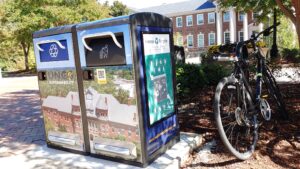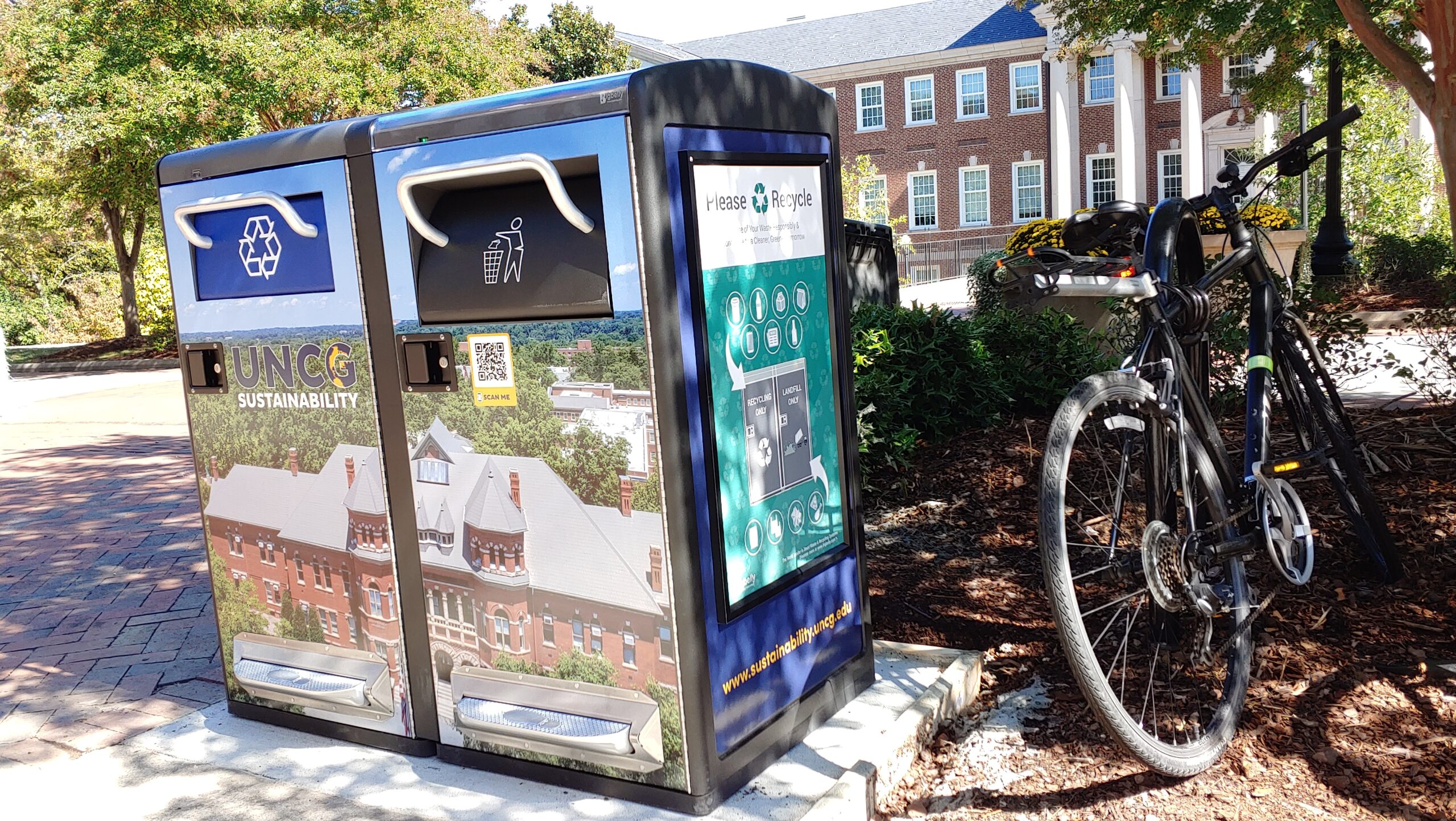
Big changes are coming to UNCG’s recycling program. Take a stroll down College Avenue and you’ll notice the new Big Belly waste and recycling receptacles. Funded by a grant from the UNCG Green Fund, the Big Belly receptacles are a smart platform of network-connected receptacles that will increase productivity in our labor force, reduce our carbon footprint, increase our waste diversion rate, and help keep our public areas clean and green.
This new initiative at UNCG comes at a time when recycling is a hot topic of conversation across the nation, including here in Greensboro, where the City recently stopped collecting glass in residential commingled curbside recycling.
“The question I get asked most often on campus is: Can this be recycled? To me, that question reveals a
couple of things,” says Sean MacInnes, UNCG’s sustainability specialist. “One, it shows people care
about our environment and they want to help and do the right thing. Two, it reveals just how
complicated the recycling process is. The Big Belly receptacles and our new recycling guide are intended
to simplify and improve that process for our campus community.”
The improvements the Big Belly receptacles provide:
- They are connected to the cellular network and have sensors that communicate their real-time
status to notify crews when they are full and ready to be collected. - An internal compactor provides greater capacity than the standard Victor Stanley bins.
- They have scales inside that will improve data collection for our landfill diversion efforts.
- Their design is aesthetically pleasing and allows branding and educational opportunities.
- They are solar powered.
“The ability to begin to modernize our waste management system allows us to continue to decrease our
carbon footprint, while optimizing our efficiency,” says Ross Rick, assistant director for facility
services. “For the students to decide that this investment was important to them is an empowering
statement that they are committed to this project in the present and the future. I sincerely thank our
students, the Green Fund Committee, and University Communications for their support, particularly
graphic designers Ariel Hewlin and Mark Unrue, who were tremendous partners in this effort.”
The UNCG Green Fund is a campus-based grant program supported by student activity fees and is
meant to forward UNCG’s Climate Action Plan. It was developed by the UNCGreen student club and
approved by the Student Government Association in 2015. Through the Green Fund, UNCG students
have invested over $200,000 to support 44 different sustainability initiatives on campus, which have
saved the University approximately $16,000 in utility costs and over 200,000 kWh hours of electricity
(equal to about 16 standard homes), annually.
“I’m excited about the Big Belly receptacles,” says Marc Keith, an English Ph.D. candidate and student
co-chair of the Green Fund Committee. “This project not only has real, tangible benefits, but helps
spread awareness about UNCG’s sustainability efforts and directly engages students in those efforts.”
UNCG recycles an average of 200 tons of commingled material annually and has an average overall
landfill diversion rate of about 43% over the past five years. On top of that, all bottle sales (water and
other beverages) have trended down across campus; last year sales were down 21.94% vs the previous
year. The University aims to become a zero-waste campus by 2050.
“The changes in the recycling commodities market are also being felt at UNCG,” says MacInnes. “Like
Greensboro and other cities across the country, we are seeing an increase in the cost of operating our
recycling program. Like all responsible businesses and stewards of our environment, we’re exploring all
the options that will allow us to keep our commitment to zero-waste in a fiscally responsible manner.
“For the time being we will continue to collect glass in our commingled recycling stream on campus. But
we ask those who live off campus to continue to use the City’s free drop-off locations for glass
recycling. We get charged per ton and glass is the heaviest material. There’s also low demand for it in
the market. Those factors,” MacInnes says, “make it expensive to recycle, which is one of the reasons
the City made the decision it did. Although we operate on a much smaller scale than the City, the
increase in cost is not insignificant for us and we ask everyone to be considerate of that. But if you live in
the dorms or if you buy a beverage in a glass bottle from a campus vendor, please continue to recycle
glass here.”
You can download UNCG’s new recycling guide here. And MacInnes recommends everyone download
the City’s GSO Collects app (available on Android and Apple) and take advantage of the app’s Waste
Wizard. “Our recycling goes to the same place as the City’s and other than the fact that we’ll continue to
accept glass bottles and jars, and plastic cups as long as they have recycling numbers 1, 2, and 5, you
can’t go wrong.
“It’s also important for our campus community to keep in mind that Greensboro has one of the highest
recycling contamination rates in nation and it’s an issue we have here too,” MacInnes says. “If we want
recycling costs to decrease and have more companies incorporate recycled material into their products,
then we have to empty our cups and clean our food containers before we put them in the recycling bin.
As consumers, we’re an important factor in the circular economy.”
Do you have an idea for a sustainability initiative? Proposals for the Green Fund are due on the 1st of
every month during the academic year. Project proposals requesting $1,000 or more in funding are only
accepted on November 1 and April 1. More information and the application can be found here.



